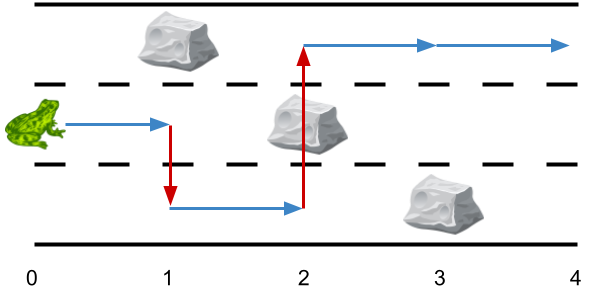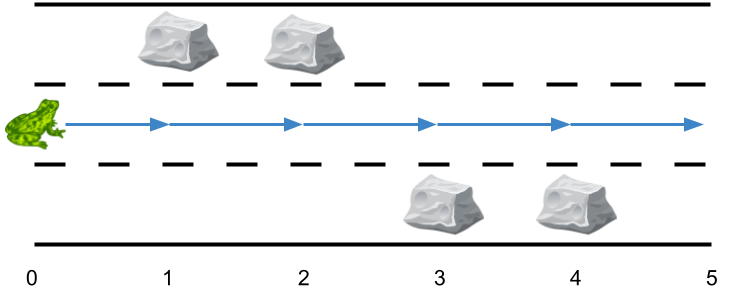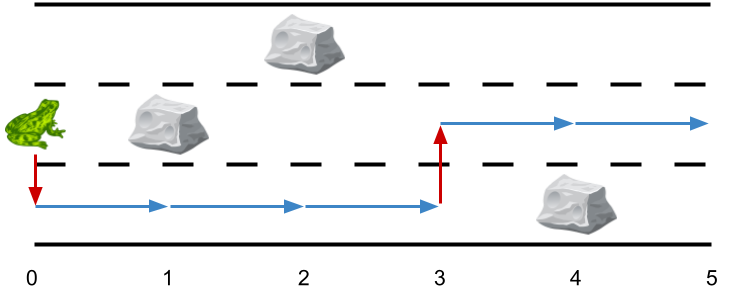Problem
There is a 3 lane road of length n that consists of n + 1 points labeled from 0 to n. A frog starts at point 0 in the **second *lane* **and wants to jump to point n. However, there could be obstacles along the way.
You are given an array obstacles of length n + 1 where each obstacles[i] (ranging from 0 to 3) describes an obstacle on the lane obstacles[i] at point i. If obstacles[i] == 0, there are no obstacles at point i. There will be at most one obstacle in the 3 lanes at each point.
- For example, if
obstacles[2] == 1, then there is an obstacle on lane 1 at point 2.
The frog can only travel from point i to point i + 1 on the same lane if there is not an obstacle on the lane at point i + 1. To avoid obstacles, the frog can also perform a side jump to jump to another lane (even if they are not adjacent) at the same point if there is no obstacle on the new lane.
- For example, the frog can jump from lane 3 at point 3 to lane 1 at point 3.
Return** the minimum number of side jumps the frog needs to reach any lane at point n starting from lane 2 at point 0.**
Note: There will be no obstacles on points 0 and n.
Example 1:

Input: obstacles = [0,1,2,3,0]
Output: 2
Explanation: The optimal solution is shown by the arrows above. There are 2 side jumps (red arrows).
Note that the frog can jump over obstacles only when making side jumps (as shown at point 2).
Example 2:

Input: obstacles = [0,1,1,3,3,0]
Output: 0
Explanation: There are no obstacles on lane 2. No side jumps are required.
Example 3:

Input: obstacles = [0,2,1,0,3,0]
Output: 2
Explanation: The optimal solution is shown by the arrows above. There are 2 side jumps.
Constraints:
obstacles.length == n + 11 <= n <= 5 * 10^50 <= obstacles[i] <= 3obstacles[0] == obstacles[n] == 0
Solution (Java)
class Solution {
public int minSideJumps(int[] obstacles) {
int sideJumps = 0;
int currLane = 2;
int i = 0;
while (i < obstacles.length - 1) {
if (obstacles[i + 1] == currLane) {
if (obstacles[i] != 0) {
currLane = getNextLane(obstacles[i], obstacles[i + 1]);
} else {
int j = i + 2;
while (j < obstacles.length
&& (obstacles[j] == 0 || obstacles[j] == obstacles[i + 1])) {
j++;
}
if (j < obstacles.length) {
currLane = getNextLane(obstacles[i + 1], obstacles[j]);
} else {
i = obstacles.length - 1;
}
}
sideJumps++;
}
i++;
}
return sideJumps;
}
private int getNextLane(int nextObstacle, int nextNextObstacle) {
if ((nextObstacle == 2 && nextNextObstacle == 3)
|| (nextObstacle == 3 && nextNextObstacle == 2)) {
return 1;
}
if ((nextObstacle == 1 && nextNextObstacle == 3)
|| (nextObstacle == 3 && nextNextObstacle == 1)) {
return 2;
} else {
return 3;
}
}
}
Explain:
nope.
Complexity:
- Time complexity : O(n).
- Space complexity : O(n).